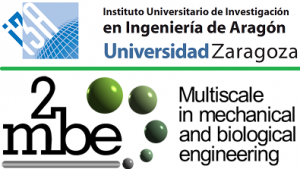
UNIZAR – UNIVERSIDAD DE ZARAGOZA
The University of Zaragoza (UNIZAR), founded in 1542, is a continuously growing institution including Engineering degrees since the early 1970s. Currently UNIZAR, with more than 40,000 students and more than 2,500 researchers belonging to 200 groups, is well positioned among National and European Universities. UNIZAR has a long-standing experience in European Projects currently participating in more than 60 projects belonging to different European programmes. The research activity of UNIZAR is developed within five Research Institutes. One of them, “Aragon Institute of Engineering Research (I3A)”, founded in 2002, will host the research activity of METASTRA. Research at the I3A is organized in four divisions: Biomedical Engineering, Information & Communications, Processes and Recycling and Industrial Technology Division and almost 30 research groups. The research team of METASTRA belongs to the Multiscale in Mechanical and Biological Engineering Group (M2BE).
Role in Metastra
The Multiscale in Mechanical and Biological Engineering group (M2BE) at the University of Zaragoza has wide experience in computational-based strategies for multiscale problems in biomechanics and mechanobiology.
M2BE works on the combination of different methodologies (computer simulation models, in-vitro experimentation and clinical validation) and it is a reference group, which has participated in 8 European Projects in the last 6 years, most of them as coordinator. Prof. Garcia-Aznar was awarded with two prestigious ERC grants.
M2BE is also working in the development of numerical techniques for efficient multiscale simulations in tissue mechanobiology and cancer. So, we have developed homogenization and localization methodologies. Validation of the computational predictions with experimental or clinical results is another topic in which they have large experience.
In METASTRA, UNIZAR will collaborate with USFD and UniBo on the development and validation of the interface models.
- Modelling tools for VPH Interfaces.
- Tissue-level model of bone-biomaterial interface.
- Validation against the dedicated experiments of the models of the vertebra with cement-bone and screw-bone interfaces.




